2012 Taiwan Documentary Screening Tour, Harvard University The 2012 Taiwan Documentary Screening Tour came to Harvard University for two nights of film screenings and discussion on April 1 and 2, 2012. On April 1, Let The Wind Carry Me (2009), co-directed by Chiang Hsiu-chiung and Kwan Pun-leung, was showed to a receptive audience. The film documents the life and career of Taiwanese cinematographer Mark Lee, who has worked with some of the world’s most acclaimed directors, including Hou Hsiao-hsien. The film not only shows Lee’s unique and beautiful style of shooting films, but also reveals a rich, personal outlook on life. Following the screening, co-director Chiang Hsiu-chiung cordially answered several questions about the film from the audience. The next documentary, Somewhere Over the Cloud (2007) was screened on April 2. Director Hsiao Mei-Ling filmed her daughter Elodie on a daily basis for the first several years of her life, documenting her “virtual” relationship over the internet with her father, who lives in France. Over the course of Elodie’s trips to France with her mother and her father’s visits to Taiwan, the roles that technology plays in her life comes into question. The lively discussion with the director that followed queried both the webcam technology and the filmmaker’s own role in her daughter’s psychological and emotional development. Following the screenings at Harvard, the Documentary Film Screening Tour visited Rutgers University, the University of Pennsylvania, and Duke University, as well as holding screenings at the Taiwan Academies in New York, Houston, and Los Angeles. The events at Harvard were sponsored by the Council for Cultural Affairs, Taiwan Taipei Cultural Center, Taiwan Economic and Cultural Office in New York, the Fairbank Center for Chinese Studies at Harvard University, and CCK-IUC.
Daoist Studies Lecture Series, McGill University
Internet and Ideology in China: A Lecture by Xu Zidong, Harvard University Professor Xu Zidong, chair of the Department of Chinese Studies at Lingnan University, Hong Kong, and a well-known public intellectual, gave a talk titled “Internet and Ideology in China: Starting with a ‘Transgressive Discourse’” at the Harvard Yenching Institute on April 13, 2012. Professor Xu characterized public opinions on China's internet as favoring the poor over the rich, and favoring the common folks over the officials, and traced these public opinions connections to political discourses during PRC's early decades and the Cultural Revolution. In particular he focused on the concept of “the People,” or renmin. The term derives its power from the ability to exclude part of the population, argues Professor Xu, as he examines how the concept has evolved in China's modern and contemporary history, and how the public discourses on the internet now joins in its re-definition. About forty people attended Professor Xu's talk, and a lively discussion followed the talk. This event was co-sponsored by CCK-IUC. Professor Xu Zidong lectures on “Internet and Ideology in China” at Harvard University on April 13, 2012. Second Annual Workshop of the Modern China Seminar: Culture and Society, University of Pennsylvania The Second Annual Workshop of the Modern China Seminar: Culture and Society at the University of Pennsylvania was held on April 14, 2012. The Modern China Seminar was started in 2011 and seeks to provide an inter-university forum for the study of modern Chinese literature, culture, history, and society. It offers an interdisciplinary program for the exchange of ideas on specific scholarly questions in modern China studies in American academia. Funded by CCK-IUC and cosponsored by the Department of East Asian Languages and Civilizations and the Center for East Asian Studies at the University of Pennsylvania, this year’s workshop brought together scholars from eight universities and institutions in the United States and attracted the interest of scholars and students alike. Participants included scholars of Chinese, Japanese, English, Asian-American, and Indian literatures, histories, and comparative literature, as well as scholars of feminism and cinema studies. This workshop included three paper presentations: Tani E. Barlow (Rice University), “Wang Guangmei’s Qipao: Era and Event,” Yomi Braester (University of Washington), “A Genealogy of Cinephilia in the Maoist Period,” and Xiaojue Wang (University of Pennsylvania), “How Was Modern Chinese Literature Invented During the Cold War?” Ania Loomba (University of Pennsylvania), Weijie Song (Rutgers University), and Jingyuan Zhang (Georgetown University) served as readers. These three papers explored how the Cold War political and cultural conditions in China and Asia of the 1950s and 1960s affected the formation of new categories and discursive frameworks in the fields of literary studies, film criticism, and women’s studies. Participants of the Modern China Seminar: Culture and Society, held at the University of Pennsylvania on April 14, 2012. Frames of Taiwan: An International Workshop, University of Texas, Austin Sponsored by CCK-IUC, the Department of Asian Studies at the University of Texas-Austin, the Taiwan Grant, and the China Endowment, "Frames of Taiwan: An International Workshop" was held at the University of Texas at Austin on April 28-29, 2012. The workshop began with Margaret Hillenbrand’s (Oxford University) keynote speech on the literature by overseas students, or liuxuesheng wenxue. The speech covered a wide range of writers from Yu Dafu to Pai Hsien-yung and set a comparative framework unrestricted by concepts of “national literature.” In the four panels that followed, a wide range of topics related to Taiwan were presented and discussed. From the political and cultural implications of a changing ethnic composition and the discourse of “ecocriticism” on the island, to the formation of transnational networks in the Taiwan film industry, literature and literary criticism, and cultural studies. The presenters sparked intense discussion regarding the position Taiwan occupies in postcolonial and Sinophone studies, in multiethnic and multilingual translation, and in the tension between nativism and globalization. The workshop is very well-attended and questions from the audience also contributed greatly to the discussion. The workshop concluded with an outing to the cinema to see the award-winning Taiwanese film The Warriors of Rainbow: Seediq Bale, directed Wei Te-sheng, which was followed by a lively post-screening discussion. Participants of "Frames of Taiwan: An International Workshop" at the University of Texas at Austin on April 28-29, 2012. Chinese Medieval Studies Workshop 8th Annual Meeting, Rutgers University On The 8th annual meeting of the Chinese Medieval Studies Workshop was held at Rutgers University on May 5, 2012. This workshop, inaugurated by Professor Wendy Swartz of Rutgers and funded by CCK-IUC, is a major academic forum for the exchange of ideas and the advancement of scholarship. Distinguished scholars from across the United States working on medieval Chinese literature, history, religion, and visual culture, have been meeting annually in this forum since 2003 to discuss their current research, and over the years students from Columbia, Harvard, Yale, Princeton, and Rutgers have attended the meetings.Ground-breaking research and methodology first presented at these workshops have found their way into notable and award- winning books and journal articles. This workshop has also served as a lively and dynamic forum in which scholars could interact and collaborate. A major collaborative book project, Early Medieval China: A Sourcebook (forthcoming in January 2013, Columbia University Press), edited by Wendy Swartz et al., is a good example of the fruitfulness resulting from building scholarly relations through this workshop. Out of Bounds: Sinophone Perspectives on Chinese Cultural History, 11th Annual International Junior Scholars Conference on Sinology, National Chung Cheng University 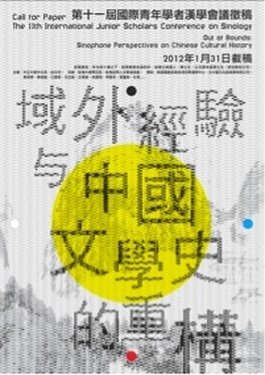 Following an open call for papers, the conference committee selected 27 of 42 applicants to present at the 11th Annual International Junior Scholars Conference on Sinology, held at National Chung Cheng University from May 26-27, 2012. The conference included: two young scholars from the United States, one from Canada, two from Japan, one from the Czech Republic, 13 from Taiwan, 7 from Mainland China and one from Hong Kong. The conference was held for two days and took place in two different conference rooms. The keynote session included a paper delivered by Professor Ke Qingming (National Taiwan University), and another piece contributed by Professor David Der-wei Wang (Harvard University), which was presented by a student on his behalf. There were 9 time slots for the paper presentations, one time slot for a seminar and in addition one forum for senior scholars and one for young scholars. The papers mostly focused on Sinophone literature, converging the discussions on methodology and recruiting scholars from different prestigious institutions, with the ambition to explore new literary dimensions. Early China Seminar 2011-2012 Annual Report, Columbia UniversityIn 2011-2012, Professors Li Feng 李峰 (Columbia University) and David W. Pankenier 班大爲 (Lehigh University) have co-chaired an overloaded program in the Early China Seminar. The seminar year began on October 1, 2011 with two paper presentations by Kenneth Holloway (Florida State University) on “The Transition from Immanent to Transcendent: Situating Religion in the ‘Xing zi mingchu’ 性自命出 between the Analects and the Daode jing,” and Andrew Myer (CUNY, Brooklyn College) on “The Baseness of Knights Truly Runs Deep 士之賤也, 亦甚矣” which deals with the complex debate about the status of the Shi 士 in the Warring States period. The interests in excavated texts continued to be explored later in two more papers: the first by Charles Sanft (Institute for Advanced Study, Nov. 19) introduces the contents and styles of the population registers of the Qin Empire recently excavated from a well in Liye 里耶, Hunan; in the second paper, centering on a comparison of the Xing zi ming chu from Guodian and the Xing qing lun 性情論among the Shanghai Museum manuscripts, Matthias L. Richter (University of Colorado at Boulder, Feb. 11) argues that the different codicological arrangements of the two texts seem to reflect different stages of textual accretion in the Warring States period. Archaeological data are dealt more extensively in two papers: Lillian Tseng’s (NYU, Nov. 19) paper, “Picturing Heaven in Early China,” reviews the archaeological excavation of the Han dynasty Bright Hall 明堂 in Xi’an and discusses its meaning for political legitimacy. Sun Yan’s (Gettysburg College, Feb. 11) paper, “Material Culture, Social Identities and Power of the Western Zhou,” takes up the issue of cultural and group identity as reflected in the cemetery of the state of Yu in Baoji and the most recently discovered cemetery of the Peng 倗Lineage in Shanxi. A highlight of the ECS activity in 2011-2012 is the international conference, “Before Empire: An International Conference on the Early History and Archaeology of Qin” (April 6-7, 2012), that it co-sponsored with the Department of East Asian Languages and Cultures, Columbia University. The conference brought a group of four senior archaeologists from China, responsible for some of the most important discoveries relating to the early Qin state, together with leading Western experts to discuss their implications for understanding the early development of Qin and the eventual rise of the Qin Empire in 221 BC. The conference was well attended by scholars from all over the country and it was one of the most important events in Chinese archaeology in North America in recent years. Participants of the Early Qin conference, co-sponsored by the Early China Seminar, held at Columbia University on April 6-7, 2012. On May 12, 2012, the last meeting of the year of the Early China Seminar will be held in the form of a small conference with a line of four papers. The meeting will focus on the Han-Wei period. Topics to be discussed include the background of the Chuci 楚辭 commentary, the cultural image of the Yue 越 people, the archaeology of the Straight Road 直道 of the Qin Empire, and recent archaeological surveys of Pingcheng 平城, the capital of Northern Wei, etc. Scholars and graduate students beyond the usual ECS-group are welcome to attend, but prior contacts with the seminar’s co-chairs are appreciated.
|
Archives
September 2020
Categories |

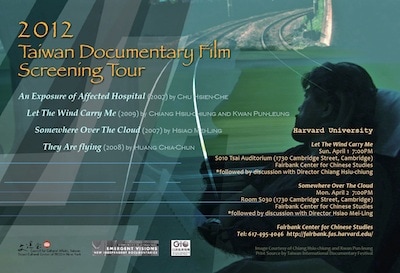
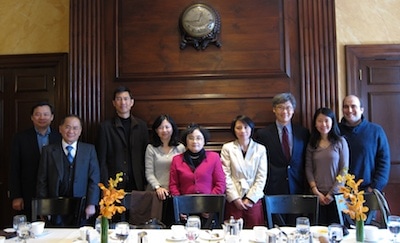
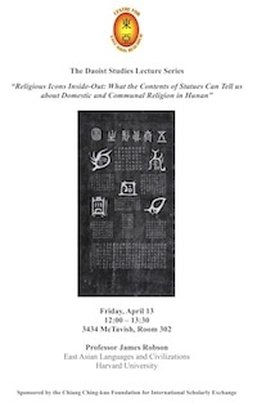
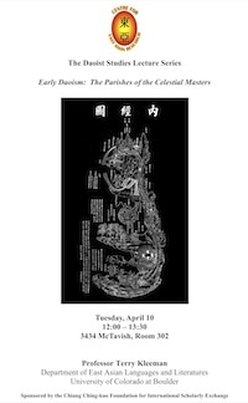
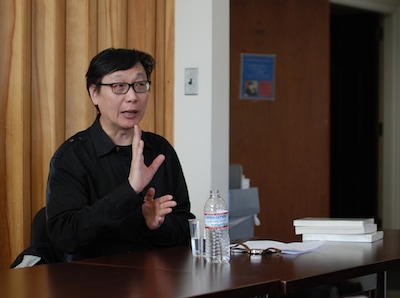
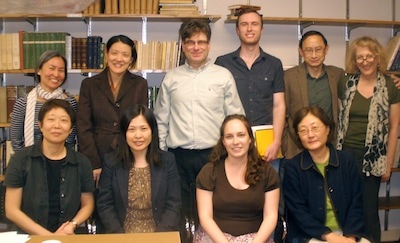
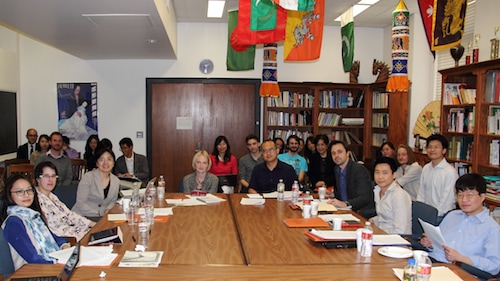
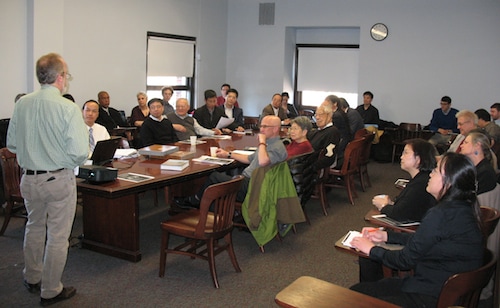
 RSS Feed
RSS Feed